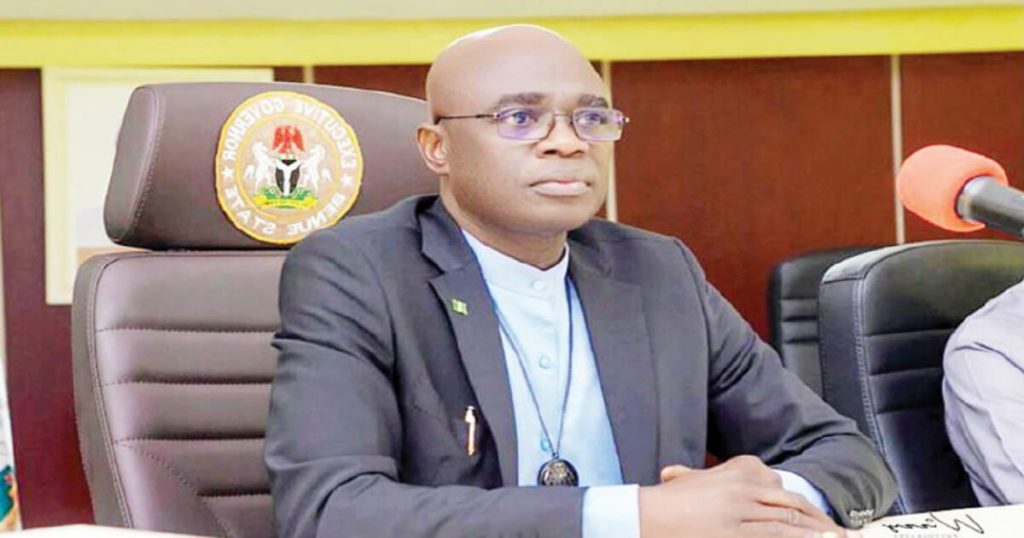The Benue State House of Assembly experienced a dramatic shift in power with the sudden resignation of Speaker Aondona Dajoh and the swift election of Alfred Emberga as his successor. This political upheaval followed weeks of tension and internal conflict within the Assembly, stemming from the suspension of 13 lawmakers earlier in the year for allegedly opposing the removal of the state’s Chief Judge. While the suspended lawmakers had initially supported the Chief Judge’s removal, they later recanted their position, citing procedural irregularities. Their subsequent reinstatement only added fuel to the simmering discontent within the legislature. Ironically, Emberga himself had been among a group of lawmakers suspended just days before his election for challenging Dajoh’s leadership. However, in a rapid turn of events, the suspension was lifted during an emergency sitting, paving the way for his nomination and unopposed election as Speaker.
The emergency session, convened amidst palpable tension, saw 27 of the 32 lawmakers discreetly entering the Assembly complex through a back entrance, highlighting the clandestine nature of the proceedings. The swiftness of the transition, coupled with the unusual timing and access protocols, fueled speculation about the behind-the-scenes maneuvering that facilitated Emberga’s ascent to the speakership. The resignation letter submitted by Dajoh cited “good faith and the interest of the state” as reasons for his departure, leaving room for interpretation regarding the pressures he may have faced. While Emberga pledged an inclusive and harmonious leadership in his acceptance speech, the circumstances surrounding his election raised questions about the true balance of power within the Assembly and the potential for future divisions.
The selection of Emberga, while seemingly a resolution to the immediate crisis, sparked further political debate due to the complexities of the state’s political landscape. Although the speakership was designated for the Benue North-West Senatorial District, comprising the Jemgba and Minda blocs, with Dajoh representing Jemgba, his replacement did not follow the expected trajectory. Instead of another lawmaker from Jemgba, Emberga, hailing from the Minda bloc, was chosen. Insiders revealed that Governor Hyacinth Alia’s allies exerted influence, maneuvering for the speakership to shift to Minda, where Emberga, a known ally of the governor, held sway. This move underscored the governor’s desire to consolidate his control over the Assembly and ensure alignment with his political agenda.
Governor Alia’s subsequent congratulatory message to Emberga further cemented the perceived orchestration of the leadership change. While the Governor emphasized collaboration and cooperation between the different branches of government, the swiftness of the transition and his apparent endorsement of Emberga suggested a strategic move to secure a more compliant legislature. This apparent consolidation of power by the governor raised concerns regarding the independence of the Assembly and its ability to effectively check the executive branch. The opposition party, the Peoples Democratic Party (PDP), condemned the developments, accusing Governor Alia of destabilizing the legislature and fostering a climate of political vendetta.
The intricacies of the power dynamics within the Benue State Assembly became more apparent with revelations about the deteriorating relationship between Dajoh and the governor. Despite initially enjoying Alia’s support, Dajoh’s actions, including the unilateral recall of suspended lawmakers and decisions perceived as embarrassing to the governor, gradually eroded their alliance. Political analysts point to Dajoh’s growing assertiveness and independent decision-making, particularly regarding legislative oversight functions, as key factors contributing to the rift. The governor’s allies viewed Dajoh’s actions as a direct challenge to his authority and a threat to his political agenda.
The election of Alfred Emberga as Speaker of the Benue State House of Assembly marked a pivotal moment in the state’s political landscape. While outwardly presented as a resolution to internal conflict and a step towards unity, the circumstances surrounding the transition suggest a more complex power play. Governor Alia’s apparent influence over the selection process, coupled with the rapid removal of a Speaker who had once enjoyed his support, raises questions about the balance of power within the state government. While Emberga’s leadership may bring a period of stability, concerns remain regarding the long-term implications for the independence of the legislature and its ability to effectively fulfill its constitutional role. The political maneuvering within the Benue State Assembly underscores the often turbulent nature of Nigerian politics and the ongoing struggle for power and influence within its democratic institutions. The true test of Emberga’s leadership lies in his ability to navigate these complex political dynamics and maintain the integrity of the Assembly while addressing the pressing needs of the people of Benue State.














